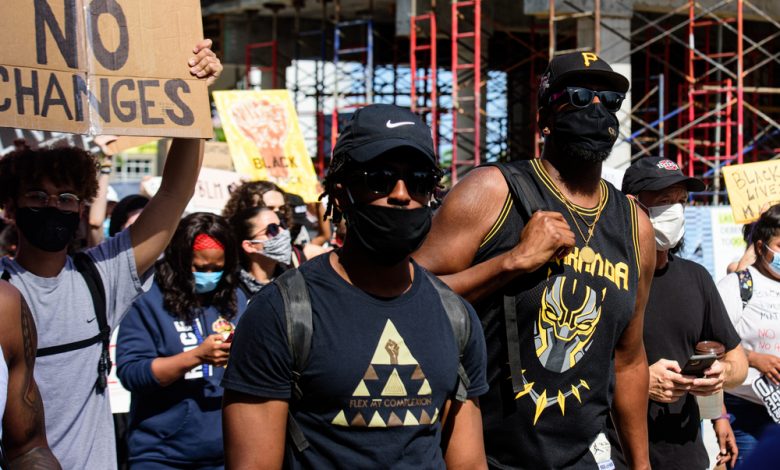
By Ed Brodow:
My mother took me to a Woolworth’s five-and-dime in Miami when I was a boy. To my astonishment, they had separate water fountains, one labeled “white” and the other labeled “colored.” Even though I didn’t fully understand the implications of what I witnessed, I knew it was wrong and have never forgotten the experience. If I believed that we were still laboring under that kind of racism in 2020, I would be a supporter of Black Lives Matter. However, I do not.
Individual instances of racism are occurring and always will occur—against both blacks and whites—but to suggest that white racism is institutionalized is to deny the colossal changes that have occurred since the civil rights movement that took place more than 50 years ago. Thanks to those changes—put in place by blacks and whites together—blacks now have the same opportunities as whites. Blaming the problems of the black community on white racism is patently false, as respected African-American author Shelby Steele has pointed out in White Guilt. “It must be acknowledged that blacks are no longer oppressed in America,” he said. “America,” David Horowitz wrote in Big Agenda, “is arguably the most tolerant, least racist nation on earth.”
Militant groups such as Black Lives Matter don’t agree. BLM is predicated on two assumptions: (1) the problems of the black community can be blamed on white racism, and (2) blacks have a monopoly on bigotry. The ideological concept known as identity politics nullifies Martin Luther King’s dream of having people judged by their character instead of their skin color. Identity politics and BLM demand that we judge everyone by their skin color according to a hierarchy in which black skin is on top and white skin is on the bottom.
I take issue with both assumptions. Wall Street Journal editorial board member Jason Riley, who is black, has accused civil rights leaders of being more interested in “blaming the problems of blacks on white racism” than getting to the real causes. What are the real causes? What is the origin of the “war on blacks?” If we wanted to be truthful about the causes of social disruption in the black community, we would have to point a finger not at white America but rather at the welfare state created and perpetuated by the Democratic Party. According to black economist Thomas Sowell, the raft of government entitlement programs “relieve people of the necessity of working to provide their own livelihoods.” Relieving blacks of personal responsibility for their own lives is part of the Democratic Party’s plan to make blacks dependent on handouts from the federal government. The belief that “people are entitled to what others have produced,” says Sowell, “is at the heart of the social degeneration that can be traced back to the 1960s.”
The black family, claims the Heritage Foundation, was destroyed by “the progressive term ‘compassion’ during the War on Poverty, which began in 1964.” The number of African-American lives damaged or destroyed by Democratic Party welfare policies, says David Horowitz, “would exceed the wildest dreams of any klansman.” The legacy of the Left’s welfare system is the break-up of low-income black families, the explosion of out-of-wedlock births, systemic poverty, higher black crime statistics and rates of incarceration, and the substantial decrease of black households headed by someone who works.
The primary fallacy of the Left’s redistribution plan is that it does nothing to end the pattern of poverty. The current system of welfare entitlements benefits no one other than the charter members of the Victimization Industry, people like Jesse Jackson and Al Sharpton. The rationale for the welfare state is the perception that low-income blacks can’t make it on their own. “The problem is that Washington is building a culture of dependency,” reports CNN, “with ever more people relying on an ever-growing federal government to give them cash or benefits.” No group has been impacted by this more than blacks. Under this culture of dependency, welfare recipients lose the work habits and job skills that would otherwise make them independent. By providing a steady stream of income to unwed mothers, the system has eliminated fathers because payments are tied to their absence. Poverty is transferred from generation to generation with no hope in sight.
The second assumption of BLM is that blacks have a monopoly on bigotry. Since when? Try telling that to Hispanics, Jews, Irish, Italians, and other groups that have been on the receiving end of discrimination and intolerance. Watch movies like “Gentlemen’s Agreement” and “Gangs of New York” if you want to understand that racism is not aimed solely at blacks. I read an article by an angry black woman who believes that whites can’t possibly appreciate black suffering because “You’ve never had a defining moment in your childhood or your life where you realize your skin color alone makes other people hate you.” I am a white man yet I have experienced many such “defining” moments.
For most of my first 21 years, my family lived in the Brooklyn area known as Bedford-Stuyvesant, the largest black “ghetto” in the US. Throughout my childhood, I was insulted and physically assaulted by my black neighbors simply because they hated my skin color. Although the media ignores it, black-on-white violence, derived from anti-white prejudice, is rampant. Black racism is alive and well. A Rasmussen poll reported that 37 percent of American adults think most black Americans are racist, while only 15 percent say the same about whites.
My criticism of Black Lives Matter is that the black experience of racism, while abhorrent, does not give blacks the right to demand better treatment than anyone else. It does not justify the destruction of our institutions and the eradication of American values in order to make restitution for black grievances, which is precisely what BLM preaches. Demands for giving special treatment to any one group are in violation of the equal protection clause. They are also the worst kind of racism.





Leave a Reply
Thank you for your response.
Please verify that you are not a robot.